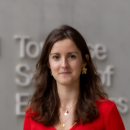Since 2005, Toulouse School of Economics has been organising the annual Jean-Jacques Laffont Prize which is awarded to a renowned international economist whose research, in the spirit of the work undertaken by Professor Jean-Jacques Laffont, combines both the theoretical and the empirical. The prize laureate presents his or her work at a public lecture, in partnership with the city of Toulouse and its Mayor.
In tribute of Jean-Jacques Laffont - founding father of TSE
2025 Jean-Jacques Laffont Prize
This year, the Prize has been awarded on October 30, to Penny Goldberg from Yale University.


The prize winners present their work at a public event wich is largely attended by business leaders, decisions makers, economists, TSE students and researches.
| Year | Laureate | Lectures | University | Nobel prize |
| 2025 | Penny Goldberg | Quality Upgrading in the Colombian Coffee Sector | Yale University | |
| 2024 | Mike D. Whinston | Economic Theory, Empirics & Antitrust | MIT | |
| 2023 | Pierre-André CHIAPPORI | Human Capital and the Family | Columbia University | |
| 2022 | Philippe AGHION | Rethink Capitalism : the power of creative destruction | Collège de France | 2025 |
| 2021 | Roland BENABOU | Beliefs and Misbeliefs: The Economics of Wishful Thinking | Princeton University | |
| 2020 | Matthew O. JACKSON | The Dynamics of Social Networks and some of their Economic Consequences | Stanford University | |
| 2019 | Marianne BERTRAND | Gender Inequalities in the 21st Century | University of Chicago Booth School of Business | |
| 2018 | Daron ACEMOGLU | A narrow path to freedom: what weight for the state in the face of civil society? | MIT Economics | 2024 |
| 2017 | Ariel PAKES | Price and productivity: from company's choices to market results. | Harvard University | |
| 2016 | Susan ATHEY | The Internet and the News Industry | Standford Business School of Graduate | |
| 2015 | Elhanan HELPMAN | Globalization and inequalities | Harvard University | |
| 2014 | Joseph. E. Stiglitz | Creating the knowledge society: a new approach to growth, development and social progress | Columbia University - Columbia Business School | 2001 |
| 2013 | Eric MASKIN | Topic in Elections and Mechanism Design. | Harvard University | 2007 |
| 2012 | Robert M. TOWNSEND | Financial Design and Economic Development | MIT Economics | |
| 2010 | Robert B. WILSON | Stringent Criteria for Rational Strategic Behavior. | Standford Business School of Graduate | 2020 |
| 2009 | Roger MYERSON | State-Building, Leadership, and Local Democracy. | University of Chicago | 2007 |
| 2008 | Richard BLUNDELL | Designing a Tax System for the 21st Century: The Role of Theory and Evidence. | University College London | |
| 2007 | Stephen ROSS | The Cost of Social Security. | University of Connecticut | |
| 2006 | Daniel McFADDEN | How Consumers Respond to Incentives. | University of California, Berkeley | 2000 |
| 2005 | Peter A. DIAMOND | Pensions for an Aging Population. | MIT Economics | 2010 |
Before Professor Laffont's passing, the Institute organized each year a distinguished lecture honoring an internationally recognized economist.
| 2004 | James HECKMAN | The Technology of Human Skill Formation and its Implications for Public Policy. | University of Chicago | 2000 |
| 2003 | Olivier Jean BLANCHARD | Peut-on éliminer le chômage en Europe? | MIT | |
| 2002 | Tony ATKINSON | La distribution des revenus dans les pays de l'OCDE au XXème siècle. | Oxford University | |
| 2001 | Dale JORGENSON | Information Technology and Economic Growth. | Harvard University | |
| 2000 | James MIRRLESS | What Taxes Should There Be? | Cambridge University | 1996 |
| 1999 | William NORDHAUS | Global Public Goods and the Problem of Global Warming. | Yale University | 2018 |
| 1997 | Hayne LELAND | Produits dérivés et gestion du risque dans les grandes entreprises américaines. | Haas School of Business (Univ. California Berkeley) | |
| 1996 | Paul SAMUELSON | American and European Economic Divergences at Centuries End. | MIT | 1970 |
| 1995 | Kenneth ARROW | Discounting Climate Change : Planning for an Uncertain Future. | Stanford University | 1972 |
| 1994 | Jacques DREZE | L'emploi en Europe. | University of Liège | |
| 1993 | Robert SOLOW | La Nouvelle Politique Economique américaine. | MIT | 1987 |
Jean-Jacques Laffont was a brilliant economist. He was appreciated for his vision, courage and generosity. His scientific output is impressive in its quantity, quality and scope. He is the author of 17 books and 200 articles in numerous economic domains. He was one of the founding fathers of the theory of information, particularly in the area of anti-selection, the study of interactions and contracts under asymmetry of information. He received many honors: the Silver Medal of the CNRS (1990); Honorary Member of the American Economic Association (1991); Foreign Honorary Member of the Academy of Arts and Sciences (1993); jointly with Jean Tirole, the Yrjo-Jahnsson prize from the European Economics Association, awarded each year to the best European economist under the age of 45 (1993).
Not satisfied with all that he was doing for economic research in France, Jean-Jacques Laffont also wanted to use his abilities for the benefit of developing countries. He travelled extensively, creating teaching facilities and encouraging research in China, Africa and Latin America. In another of his research fields, applied theory, Jean-Jacques Laffont focused on the application of the theory of incentives to the regulative mechanisms for network industries (telecommunications, electricity etc). Finally, while the technical demands of each subfield push most economists to specialise in a single area, he also made major contributions in econometrics. His work on the econometrics of auctions in the mid ‘nineties is considered path-breaking. His work on structural estimation in industrial economics (on the detection of cartels, for example) is also fundamental in the field.
Jean-Jacques Laffont displayed exceptional intellectual and social qualities which he used to serve his native region, the science of economics, the French university system, his students and his colleagues. These gifts allowed him to build both an outstanding career in research and as an academic innovator. As an academic leader, he always displayed a great generosity, encouraging initiative and the intellectual development of his co-workers. This same generous spirit was also manifested in his commitment to developmental economics, which was increasingly his focus these last years.




